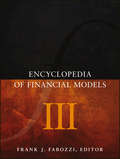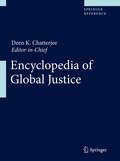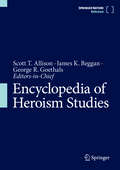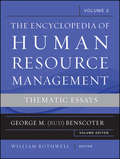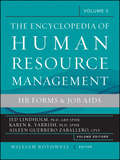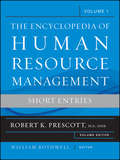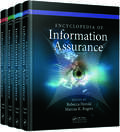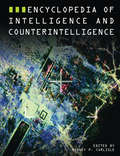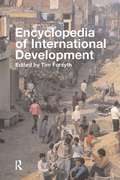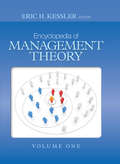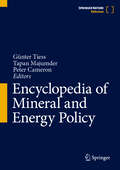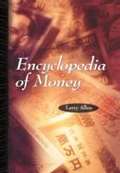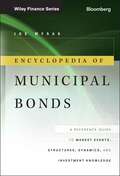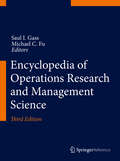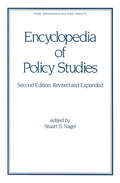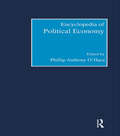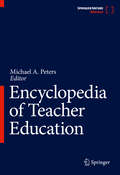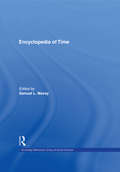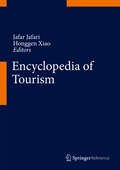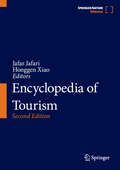- Table View
- List View
Encyclopedia of Financial Models, Volume III
by Frank J. FabozziVolume 3 of the Encyclopedia of Financial Models The need for serious coverage of financial modeling has never been greater, especially with the size, diversity, and efficiency of modern capital markets. With this in mind, the Encyclopedia of Financial Models has been created to help a broad spectrum of individuals—ranging from finance professionals to academics and students—understand financial modeling and make use of the various models currently available. Incorporating timely research and in-depth analysis, Volume 3 of the Encyclopedia of Financial Models covers both established and cutting-edge models and discusses their real-world applications. Edited by Frank Fabozzi, this volume includes contributions from global financial experts as well as academics with extensive consulting experience in this field. Organized alphabetically by category, this reliable resource consists of forty-four informative entries and provides readers with a balanced understanding of today’s dynamic world of financial modeling. Volume 3 covers Mortgage-Backed Securities Analysis and Valuation, Operational Risk, Optimization Tools, Probability Theory, Risk Measures, Software for Financial Modeling, Stochastic Processes and Tools, Term Structure Modeling, Trading Cost Models, and Volatility Emphasizes both technical and implementation issues, providing researchers, educators, students, and practitioners with the necessary background to deal with issues related to financial modeling The 3-Volume Set contains coverage of the fundamentals and advances in financial modeling and provides the mathematical and statistical techniques needed to develop and test financial models Financial models have become increasingly commonplace, as well as complex. They are essential in a wide range of financial endeavors, and the Encyclopedia of Financial Models will help put them in perspective.
Encyclopedia of Global Justice
by Deen K. ChatterjeeThis two-volume Encyclopedia of Global Justice, published by Springer, along with Springer's book series, Studies in Global Justice, is a major publication venture toward a comprehensive coverage of this timely topic. The Encyclopedia is an international, interdisciplinary, and collaborative project, spanning all the relevant areas of scholarship related to issues of global justice, and edited and advised by leading scholars from around the world. The wide-ranging entries present the latest ideas on this complex subject by authors who are at the cutting edge of inquiry. The Encyclopedia sets the tone and direction of this increasingly important area of scholarship for years to come. The entries number around 500 and consist of essays of 300 to 5000 words. The inclusion and length of entries are based on their significance to the topic of global justice, regardless of their importance in other areas.
Encyclopedia of Heroism Studies
by George R. Goethals Scott T. Allison James K. BegganThis reference work is an important resource in the growing field of heroism studies. It presents concepts, research, and events key to understanding heroism, heroic leadership, heroism development, heroism science, and their relevant applications to businesses, organizations, clinical psychology, human wellness, human growth potential, public health, social justice, social activism, and the humanities. The encyclopedia emphasizes five key realms of theory and application: Business and organization, focusing on management effectiveness, emotional intelligence, empowerment, ethics, transformational leadership, product branding, motivation, employee wellness, entrepreneurship, and whistleblowers; clinical-health psychology and public health, focusing on stress and trauma, maltreatment, emotional distress, bullying, psychopathy, depression, anxiety, family disfunction, chronic illness, and healthcare workers’ wellbeing; human growth and positive psychology, discussing altruism, authenticity, character strengths, compassion, elevation, emotional agility, eudaimonia, morality, empathy, flourishing, flow, self-efficacy, joy, kindness, prospection, moral development, courage, and resilience; social justice and activism, highlighting anti-racism, anti-bullying, civil disobedience, civil rights heroes, climate change, environmental heroes, enslavement heroes, human rights heroism, humanitarian heroes, inclusivity, LGBTQ+ heroism, #metoo movement heroism, racism, sustainability, and women’s suffrage heroes; and humanities, relating to the mythic hero’s journey, bliss, boon, crossing the threshold, epic heroes, fairy tales, fiction, language and rhetoric, narratives, mythology, hero monomyth, humanities and heroism, religious heroes, and tragic heroes.
Encyclopedia of Human Resource Management, Critical and Emerging Issues in Human Resources
by William J. Rothwell George M. BenscoterHuman resource management is a vital function of any organization, at the nexus of business practice, psychology, and law. This one-of-a-kind and all-in-one print and online encyclopedia offers access to information on all manner of topics and issues related to the "people" side of business. Volume 3 provides a summary of Employment Law, Labor Relations, and Human Resources Laws and Practices from around the world, key primary documents, and links to citations to law in the natural language of the country. For professionals in human resource management, the Encyclopedia will be a handy reference. For students, researchers, and educators, it will be a first stop on the way to more in-depth research. For entrepreneurs, managers, and employees, it will serve as an essential introduction and practical guide.
Encyclopedia of Human Resource Management, Human Resources and Employment Forms
by William J. Rothwell Aileen Zaballero Karen Yarrish Ph.D., SPHR Jed Lindholm Ph.D., GRP, SPHRHuman resource management is a vital function of any organization, at the nexus of business practice, psychology, and law. This one-of-a-kind and all-in-one print and online encyclopedia offers access to information on all manner of topics and issues related to the "people" side of business. Volume 2 features hundreds of model employment forms; any item from Volume 1 that has forms associated with it will have forms provided in this volume. Forms are customizable or reproducible and compliant with current regulations. For students, researchers, and educators, the Encyclopedia will be a first stop on the way to more in-depth research. For entrepreneurs, managers, and employees, it will serve as an essential introduction and practical guide. For professionals in human resource management, it will be a handy reference.
Encyclopedia of Human Resource Management, Key Topics and Issues
by William J. Rothwell Robert K. Prescott Ph. D., SPHRHuman resource management is a vital function of any organization, at the nexus of business practice, psychology, and law. This one-of-a-kind and all-in-one print and online encyclopedia offers access to information on all manner of topics and issues related to the "people" side of business. Volume 1 covers an A-Z spectrum of all the key topics and issues related to human resource management, labor, and workplace policy. For professionals in human resource management, the Encyclopedia serves as a must-have reference. For students, researchers, and educators, it is a first stop on the way to more in-depth research.
Encyclopedia of Information Assurance - 4 Volume Set (Print)
by Rebecca Herold and Marcus K. RogersCharged with ensuring the confidentiality, integrity, availability, and delivery of all forms of an entity's information, Information Assurance (IA) professionals require a fundamental understanding of a wide range of specializations, including digital forensics, fraud examination, systems engineering, security risk management, privacy, and compliance. Establishing this understanding and keeping it up to date requires a resource with coverage as diverse as the field it covers. Filling this need, the Encyclopedia of Information Assurance presents an up-to-date collection of peer-reviewed articles and references written by authorities in their fields. From risk management and privacy to auditing and compliance, the encyclopedia’s four volumes provide comprehensive coverage of the key topics related to information assurance. This complete IA resource: Supplies the understanding needed to help prevent the misuse of sensitive information Explains how to maintain the integrity of critical systems Details effective tools, techniques, and methods for protecting personal and corporate data against the latest threats Provides valuable examples, case studies, and discussions on how to address common and emerging IA challenges Placing the wisdom of leading researchers and practitioners at your fingertips, this authoritative reference provides the knowledge and insight needed to avoid common pitfalls and stay one step ahead of evolving threats.Also Available OnlineThis Taylor & Francis encyclopedia is also available through online subscription, offering a variety of extra benefits for researchers, students, and librarians, including: Citation tracking and alerts Active reference linking Saved searches and marked lists HTML and PDF format optionsContact Taylor and Francis for more information or to inquire about subscription options and print/online combination packages.US: (Tel) 1.888.318.2367; (E-mail) e-reference@taylorandfrancis.comInternational: (Tel) +44 (0) 20 7017 6062; (E-mail) online.sales@tandf.co.uk
Encyclopedia of Intelligence and Counterintelligence
by Rodney CarlisleFrom references to secret agents in The Art of War in 400 B.C.E. to the Bush administration's ongoing War on Terrorism, espionage has always been an essential part of state security policies. This illustrated encyclopedia traces the fascinating stories of spies, intelligence, and counterintelligence throughout history, both internationally and in the United States. Written specifically for students and general readers by scholars, former intelligence officers, and other experts, Encyclopedia of Intelligence and Counterintelligence provides a unique background perspective for viewing history and current events. In easy-to-understand, non-technical language, it explains how espionage works as a function of national policy; traces the roots of national security; profiles key intelligence leaders, agents, and double-agents; discusses intelligence concepts and techniques; and profiles the security organizations and intelligence history and policies of nations around the world. As a special feature, the set also includes forewords by former CIA Director Robert M. Gates and former KGB Major General Oleg Kalugin that help clarify the evolution of intelligence and counterintelligence and their crucial roles in world affairs today.
Encyclopedia of Intelligence and Counterintelligence
by Rodney CarlisleFrom references to secret agents in The Art of War in 400 B.C.E. to the Bush administration's ongoing War on Terrorism, espionage has always been an essential part of state security policies. This illustrated encyclopedia traces the fascinating stories of spies, intelligence, and counterintelligence throughout history, both internationally and in the United States. Written specifically for students and general readers by scholars, former intelligence officers, and other experts, Encyclopedia of Intelligence and Counterintelligence provides a unique background perspective for viewing history and current events. In easy-to-understand, non-technical language, it explains how espionage works as a function of national policy; traces the roots of national security; profiles key intelligence leaders, agents, and double-agents; discusses intelligence concepts and techniques; and profiles the security organizations and intelligence history and policies of nations around the world. As a special feature, the set also includes forewords by former CIA Director Robert M. Gates and former KGB Major General Oleg Kalugin that help clarify the evolution of intelligence and counterintelligence and their crucial roles in world affairs today.
Encyclopedia of International Development
by Tim ForsythInternational development is now a major global activity and the focus of the rapidly growing academic discipline of development studies. The Encyclopedia of International Development provides definitions and discussions of the key concepts, controversies and actors associated with international development for a readership of development workers, teachers and students. With 600 entries, ranging in length from shorter factual studies to more in-depth essays, a comprehensive system of cross references and a full index, it is the most definitive guide to international development yet published. Development is more than a simple increase in a country's wealth and living conditions. It also implies increasing people's choices and freedoms; it is change that is inclusive and empowering. Development theory and practice has important applications to questions of economic growth, trade, governance, education, healthcare, gender rights and environmental protection, and it involves issues such as international aid, peacekeeping, famine relief and strategies against HIV/AIDS. The Encyclopedia treats these topics and many more, and provides critical analyses of important actors within development such as the United Nations and World Bank, non-governmental organizations and corporations. Contributors to this volume reflect the multidisciplinary and international nature of the subject. They come from social science disciplines such as economics, international studies, political science and anthropology, and from specialities such as medicine. This Encyclopedia provides crucial information for universities, students and professional organizations involved with international development, and those interested in related topics such as international studies or other studies of social and economic change today.
Encyclopedia of Japanese Business and Management
by Allan BirdThe Encyclopedia of Japanese Business and Management is the definitive reference source for the exploration of Japanese business and management. Reflecting the multidisciplinary nature of this field, the Encyclopedia consolidates and contextualises the leading research and knowledge about the Japanese business system and Japanese management thought and practice. It will be welcomed by scholar and student alike as an essential resource for teaching, an invaluable companion to independent study, and a solid starting point for wider exploration.
Encyclopedia of Management Theory
by Eric H. KesslerIn discussing a management topic, scholars, educators, practitioners, and the media often toss out the name of a theorist (Taylor, Simon, Weber) or make a sideways reference to a particular theory (bureaucracy, total quality management, groupthink) and move on, as if assuming their audience possesses the necessary background to appreciate and integrate the reference. This is often far from the case. Individuals are frequently forced to seek out a hodgepodge of sources varying in quality and presentation to provide an overview of a particular idea. This work is designed to serve as a core reference for anyone interested in the essentials of contemporary management theory. Drawing together a team of international scholars, it examines the global landscape of the key theories and the theorists behind them, presenting them in the context needed to understand their strengths and weaknesses to thoughtfully apply them. In addition to interpretations of long-established theories, it also offers essays on cutting-edge research as one might find in a handbook. And, like an unabridged dictionary, it provides concise, to-the-point definitions of key concepts, ideas, schools, and figures. Features and Benefits: Two volumes containing over 280 signed entries provide users with the most authoritative and thorough reference resources available on management theory, both in terms of breadth and depth of coverage. Standardized presentation format, organized into categories based on validity and importance, structures entries so that readers can assess the fundamentals, evolution, and impact of theories. To ease navigation between and among related entries, a Reader’s Guide groups entries thematically and each entry is followed by Cross-References. In the electronic version, the Reader’s Guide combines with the Cross-References and a detailed Index to provide robust search-and-browse capabilities. An appendix with a Chronology of Management Theory allows readers to easily chart directions and trends in thought and theory from early times to the present. An appendix with Central Management Insights allows readers to easily understand, compare, and apply major theoretical messages of the field. Suggestions for Further Reading at the end of each entry guide readers to sources for more detailed research and discussion. Key themes include: Nature of Management Managing People, Personality, and Perception Managing Motivation Managing Interactions Managing Groups Managing Organizations Managing Environments Strategic Management Human Resources Management International Management and Diversity Managerial Decision Making, Ethics, and Creativity Management Education, Research, and Consulting Management of Operations, Quality, and Information Systems Management of Entrepreneurship Management of Learning and Change Management of Technology and Innovation Management and Leadership Management and Social / Environmental Issues PLUS: Appendix of Chronology of Management Theory PLUS: Appendix of Central Management Insights
Encyclopedia of Management Theory
by Eric H. KesslerIn discussing a management topic, scholars, educators, practitioners, and the media often toss out the name of a theorist (Taylor, Simon, Weber) or make a sideways reference to a particular theory (bureaucracy, total quality management, groupthink) and move on, as if assuming their audience possesses the necessary background to appreciate and integrate the reference. This is often far from the case. Individuals are frequently forced to seek out a hodgepodge of sources varying in quality and presentation to provide an overview of a particular idea. This work is designed to serve as a core reference for anyone interested in the essentials of contemporary management theory. Drawing together a team of international scholars, it examines the global landscape of the key theories and the theorists behind them, presenting them in the context needed to understand their strengths and weaknesses to thoughtfully apply them. In addition to interpretations of long-established theories, it also offers essays on cutting-edge research as one might find in a handbook. And, like an unabridged dictionary, it provides concise, to-the-point definitions of key concepts, ideas, schools, and figures. Features and Benefits: Two volumes containing over 280 signed entries provide users with the most authoritative and thorough reference resources available on management theory, both in terms of breadth and depth of coverage. Standardized presentation format, organized into categories based on validity and importance, structures entries so that readers can assess the fundamentals, evolution, and impact of theories. To ease navigation between and among related entries, a Reader’s Guide groups entries thematically and each entry is followed by Cross-References. In the electronic version, the Reader’s Guide combines with the Cross-References and a detailed Index to provide robust search-and-browse capabilities. An appendix with a Chronology of Management Theory allows readers to easily chart directions and trends in thought and theory from early times to the present. An appendix with Central Management Insights allows readers to easily understand, compare, and apply major theoretical messages of the field. Suggestions for Further Reading at the end of each entry guide readers to sources for more detailed research and discussion. Key themes include: Nature of Management Managing People, Personality, and Perception Managing Motivation Managing Interactions Managing Groups Managing Organizations Managing Environments Strategic Management Human Resources Management International Management and Diversity Managerial Decision Making, Ethics, and Creativity Management Education, Research, and Consulting Management of Operations, Quality, and Information Systems Management of Entrepreneurship Management of Learning and Change Management of Technology and Innovation Management and Leadership Management and Social / Environmental Issues PLUS: Appendix of Chronology of Management Theory PLUS: Appendix of Central Management Insights
Encyclopedia of Mineral and Energy Policy
by Peter Cameron Günter Tiess Tapan MajumderThis Encyclopedia provides a cutting-edge, up-to-date reference source on mineral and energy policies around the world. It offers information on GDP, population, investment scenarios and current environmental regulations in over one hundred thirty countries from 13 geographic regions around the world. It covers topics such as geo-conservation, deep mining technology as well as rare earth, green technology and international organizations that are actively involved in minerals and energy through exploration, arbitration, marketing and investment. Topical entries are presented alphabetically with extensive cross-referencing to ensure user-friendly reading. This Encyclopedia presents the work of more than 20 section editors and more than 100 international experts in the fields of mineral and energy policies. It is designed as a essential resource for researchers, students, libraries, industry, governments, and international organizations and presents a wealth of insights and guidance for corporate planning regarding exploration and financial investments, as well as for venture capitalist and international funding bodies. As such, it provides an indispensable point of reference for future research on mineral and energy policy.
Encyclopedia of Money
by Larry AllenThis illustrated volume tells the story of money, from early barter commodities to today's ubiquitous credit card. Three hundred plus entries describe the innovations, experiments, triumphs, and disasters in the development of viable media of exchange. Individual entries spotlight international monetary systems, hyperinflation, monetary debacles, fiscal controls and the gold standard. Written for non-specialists, the book avoids technical jargon and mathematics as it explains the mechanisms and intricacies of its subject.
Encyclopedia of Municipal Bonds
by Joe MysakAn accessible reference that explores every aspect of the municipal bond market Until now, there has been no accessible encyclopedia, dictionary, nor guide to the world of municipal bonds. Comprehensive and objective, this groundbreaking volume covers the history and mechanics of the municipal market in clear and understandable terms. It covers all aspects of the market, including pricing, trading, taxation issues and yields, as well as topical events such as the financial crisis, hysteria about defaults and Chapter 9 municipal bankruptcy, fraud, and regulation. Encyclopedia of Municipal Bonds also contains entries on important historical events and provides much-needed context for this field. Everything you ever wanted to know about municipal bonds in one comprehensive resource Joe Mysak is the author of the Bloomberg bestseller Handbook for Muni Issuers Demystifies the world of municipal bonds for both the novice and professional investor Explores issues such as the Orange County bankruptcy, the Jefferson County default, the New York City financial crisis, and the surprisingly recent creation of the modern municipal market Encyclopedia of Municipal Bonds offers an essential reference guide for investors, professionals, regulators, insurers, and anyone else involved in the municipal bond market.
Encyclopedia of Operations Research and Management Science
by Saul I. Gass Michael C. FuThis encyclopedia provides decision-makers in Operations Research with a comprehensive overview of the range of ideas and forces that combine in OR/MS. New topics for the third edition, include yield management, flexible queuing systems, service management, local search, tolerance sensitivity analysis, influence diagrams, knowledge management, strategy and policy making, school districting, computational biology.
Encyclopedia of Police Science: 2-volume set
by Jack R. GreeneIn 1996, Garland published the second edition of the Encyclopedia of Police Science, edited by the late William G. Bailey. The work covered all the major sectors of policing in the US. Since then much research has been done on policing issues, and there have been significant changes in techniques and in the American police system. Technological advances have refined and generated methods of investigation. Political events, such as the terrorist attacks of September 11, 2001 in the United States, have created new policing needs while affecting public opinion about law enforcement. These developments appear in the third, expanded edition of the Encyclopedia of Police Science. 380 entries examine the theoretical and practical aspects of law enforcement, discussing past and present practices. The added coverage makes the Encyclopedia more comprehensive with a greater focus on today's policing issues. Also added are themes such as accountability, the culture of police, and the legal framework that affects police decision. New topics discuss recent issues, such as Internet and crime, international terrorism, airport safety, or racial profiling. Entries are contributed by scholars as well as experts working in police departments, crime labs, and various fields of policing.
Encyclopedia of Policy Studies, Second Edition
by Stuart S. Nagel"This entirely updated and enlarged Second Edition of a landmark reference/text continues to provide comprehensive coverage of every important aspect of policy studies--discussing concepts, methods, utilization, formation, and implementation both internationally and across each level of government."
Encyclopedia of Political Economy: 2-volume set
by Phillip O'HaraThis groundbreaking Encyclopedia is the very first fully-refereed A-Z compendium of the main principles, concepts, problems, institutions, schools and policies associated with political economy. Based on developments in political economy since the 1960s, it is designed to provide a comprehensive introduction to the field as well as being an authori
Encyclopedia of Sports Management and Marketing
by Dr Linda E. Swayne Professor Mark A DoddsRequest a FREE 30-day online trial to this title at www.sagepub.com/freetrial_sroThis four-volume set introduces, on the management side, principles and procedures of economics, budgeting and finance; leadership; governance; communication; business law and ethics; and human resources practices; all in the sports context. On the marketing side this reference resource explores two broad streams: marketing of sport and of sport-related products (promoting a particular team or selling team- and sport-related merchandise, for example), and using sports as a platform for marketing non-sports products, such as celebrity endorsements of a particular brand of watch or the corporate sponsorship of a tennis tournament. Together, these four volumes offer a comprehensive and authoritative overview of the state of sports management and marketing today, providing an invaluable print or online resource for student researchers.
Encyclopedia of Teacher Education
by Michael A. PetersThis encyclopaedia is a dynamic and living reference that student teachers, teacher educators, researchers and professionals in the field of education with an accent on all aspects of teacher education, including: teaching practice; initial teacher education; teacher induction; teacher development; professional learning; teacher education policies; quality assurance; professional knowledge, standards and organisations; teacher ethics; and research on teacher education, among other issues. The Encyclopedia is an authoritative work by a collective of leading world scholars representing different cultures and traditions, the global policy convergence and counter-practices relating to the teacher education profession. The accent will be equally on teaching practice and practitioner knowledge, skills and understanding as well as current research, models and approaches to teacher education.
Encyclopedia of Time
by Samuel L. MaceyFirst published in 1994. Routledge is an imprint of Taylor & Francis, an informa company.
Encyclopedia of Tourism
by Jafar Jafari Honggen XiaoThis encyclopedia is the most comprehensive and updated source of reference in tourism research and practice. It covers both traditional and emerging concepts and terms and is fully international in its scope More than 800 contributions of over 200 internationally renowned experts provide a definitive access to the knowledge in the field of tourism, hospitality, recreation and related fields. All actors in this field will find reliable and up to date definitions and explanations of the key terms of tourism in this reference work. Tourism is the largest industry worldwide and is the main source of income for many countries With both, this practical impact of tourism and a rapidly developing academic field, with a growing number of university courses and degrees in tourism, and a flourishing research, this encyclopedia is the epicenter of this emerging and developing discipline.
Encyclopedia of Tourism
by Jafar Jafari Honggen XiaoThis encyclopedia is the most comprehensive and updated source of reference in tourism research and practice. It covers both traditional and emerging concepts and terms and is fully international in its scope. Some 769 entries by 871 internationally renowned experts from 124 countries provide a definitive access to the knowledge of tourism and its related fields. Users will find reliable and up-to-date definitions and explanations of the key terms of tourism in this reference book. Tourism is the largest industry in the world and is the main source of income for many countries. With the practical impact of worldwide tourism and the growing number of academic programs and institutions devoted to its education and research, this encyclopedia is the epicenter of this emerging and developing discipline. Editorial BoardManaging Editor: Amy Osmond Associate Editors: David Airey, Nevenka Cavlek, Peter U. C. Dieke, Juergen Gnoth, Maria Gravari-Barbas, Tazim Jamal, Kumi Kato, Francisco Madrid Flores, Yoel Mansfeld, Scott M. Meis, Regina Schlüter, Noel Scott, Honggang XuResource Editor: Beka JakeliAssistant Editors: S. Vida Muse, Peter Reim, Shun YeCartographers: Kisandul Kumarasinghe, Ashan Manamperi, Himanshi Withanage
